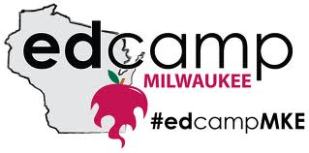Two days after attending #EdCampMKE I am experiencing what I like to call the #EdcampBump. For a period of time after any EdCamp my mind races and I start to see old lessons and the challenges that I face very differently. The materials that I produce after an Edcamp have a very different feel to them. Even more powerful is that the materials and content that my students produce in the weeks after I attend and #EdCamp are very different too.
One of the things that I like about the Edcamp model is that there is no institutional inertia holding them in place. They are driven by the ideas and interests, problems and concerns of the people who attend them. There is no set philosophy that they must adhere to and no agenda that must be followed. If the schedule does not meet your needs it is not the fault of the planners, it is on you to speak up and fix it. For this reason I believe that in 10 years the Edcamp model will be just as relevant as it is today since it will not have to shed a previously embrace set of institutional policies and values.
Case in point was the impromptu Smackdown session that was run in the café’ late on Saturday. It was thought up and made real. While I was participating I was following several Google docs from the sessions that I was interested in but chose not to attend. The Smackdown was a priority for me because of our upcoming 1:1 pilot.
Overall it is a day that I get to plan. I set my priorities for learning. I seek out further knowledge when necessary. It is as learning should be. Mostly, I knew what I needed and I set out to get it but several times people in sessions made it clear to me that there where new places that I could grow.
Edcamps are a growth medium where ideas germinate and spread, where a first year teacher has as much right to share ideas and sessions as a 20 year veteran. Edcamps foster sharing like no other PD experience I have ever attended. Edcmaps foster a sense of community among the teachers that attend them that I have never seen replicated in another format. Teachers helping teachers, giving everything they have to offer and sharing their passions, what could be better than that.
I could say so much more here but rather than go on and on I wanted to list some of the moments at #edcampmke that have stuck with me and mean the most.
- The session “What has your Attention?” Just talking about what we were passionate about. I have a list of things to read. I left and my soul felt good.
- Listening to Wisconsin teachers who have been through a lot and are facing some hardships put it all aside and discuss how to best serve their students with fewer resources.
- Watching my sister-in-law experience an #Edcamp for the first time and talking about running one herself.
- Discussing how to manage your public face and digital life on twitter and in blogs without losing who you are or the honesty of what you are saying.
- Talking to others from 1:1 schools about the concerns of the community and the “Why?” Behind such programs.
- Explaining twitter to someone who had no idea it could be used for education. I remember thinking the same thing just a few short years ago.
- And soo many more.
So thank you to the organizers of EdCamp Milwaukee for a very well run day. Thank you to all of you who shared your thoughts and passions and contributed to my growth. Growth is life.



